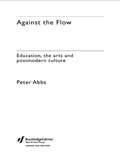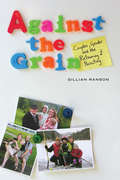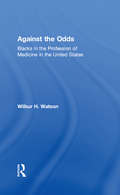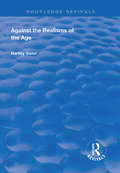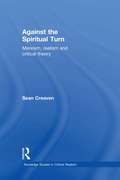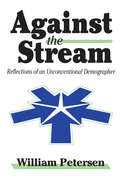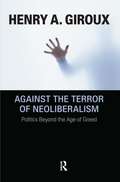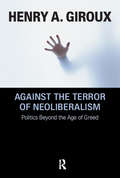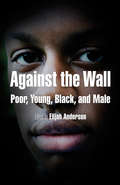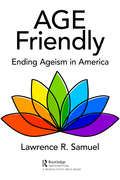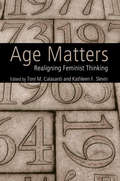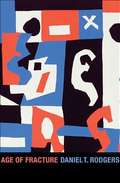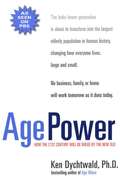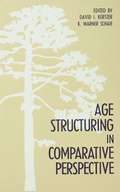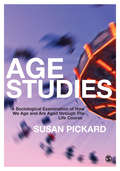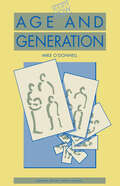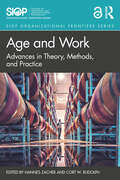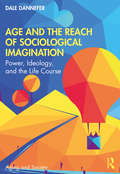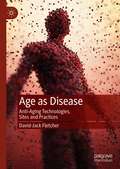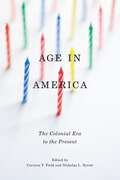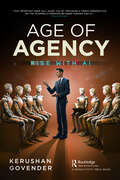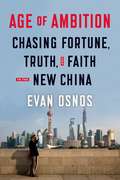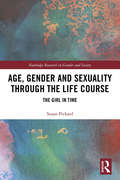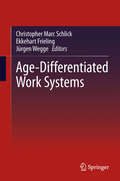- Table View
- List View
Against the Commons: A Radical History of Urban Planning
by Álvaro Sevilla-BuitragoAn alternative history of capitalist urbanization through the lens of the commons Characterized by shared, self-managed access to food, housing, and the basic conditions for a creative life, the commons are essential for communities to flourish and protect spaces of collective autonomy from capitalist encroachment. In a narrative spanning more than three centuries, Against the Commons provides a radical counterhistory of urban planning that explores how capitalism and spatial politics have evolved to address this challenge.Highlighting episodes from preindustrial England, New York City and Chicago between the 1850s and the early 1900s, Weimar-era Berlin, and neoliberal Milan, Álvaro Sevilla-Buitrago shows how capitalist urbanization has eroded the egalitarian, convivial life-worlds around the commons. The book combines detailed archival research with provocative critical theory to illuminate past and ongoing struggles over land, shared resources, public space, neighborhoods, creativity, and spatial imaginaries.Against the Commons underscores the ways urbanization shapes the social fabric of places and territories, lending particular awareness to the impact of planning and design initiatives on working-class communities and popular strata. Projecting history into the future, it outlines an alternative vision for a postcapitalist urban planning, one in which the structure of collective spaces is ultimately defined by the people who inhabit them.
Against the Flow: Education, the Art and Postmodern Culture
by Peter AbbsAt once provocative and inspiring, Against the Flow is a work of polemic from an internationally respected writer and thinker on arts education. Peter Abbs argues that contemporary education ignores the aesthetic and ethical as a result of being in thrall to such forces as the market economy and managerial and functional dictates. He identifies the present education system as being inimical to creativity and authentic learning and instead, narrowly focused on the quantitative measuring of results. This absence of a creative and ethical dimension in education has implications for art making in wider society. Art is shown as emerging from, and appealing to, the ironic postmodernist sensibility and mass media-led culture, while being devoid of philosophical significance.This book opens up a fresh and timely debate about the vital power of creativity in modern education. Drawing on examples from modern poetry, literature and visual art, it is an eloquent and passionate argument for the need to develop ethical and aesthetic energies to confront the growing vacuity of contemporary culture.
Against the Grain: Couples, Gender, And The Reframing Of Parenting
by Gillian RansonDrawing on findings from interviews done with 32 families living in cities across Canada, Ranson challenges dominant understandings of mothering and fathering by looking closely at how couples who have opted for less traditional divisions of labour negotiate their parental and household responsibilities. Included are interviews with breadwinner mothers and caregiver fathers, and with dual-earner couples, both heterosexual and same-sex, who struggle to share equally in the nurture and support of their families. A central claim of the book is that, to the extent that both parents are equally involved in hands-on caregiving, they tend to become, over time, functionally interchangeable and move away from "mothering" and "fathering," and toward parenting. Against the Grain offers us an excellent opportunity to examine how social change happens at the forefront of family life.
Against the Odds: Blacks in the Profession of Medicine in the United States
by Wilbur Watson"Racial separatism, gender discrimination, and white dominance have historically thwarted black Americans' occupational aspirations. Access to medical education has also been limited, and mobility within the profession, leading to unequal access to health care. There have, however, been notable triumphs. In Against the Odds, Wilbur Watson describes successful efforts by determined individuals and small groups of black Americans, since the early nineteenth century, to establish a strong black presence in the medical profession. Changes in medical education and hospital management, desegregation of the medical establishment, and the contemporary challenges of managed-care organizations all attest to their achievements.Watson analyzes sociocultural, political, and psychological factors associated with African-American medical practice; race and gender differences in medical education and professional development; and doctor-patient relationships during and since the period of racial separatism. He discusses the policy implications of physicians' viewpoints on issues such as folk practitioners as health care providers, medical care for the poor, abortion and euthanasia, the Tuskegee syphilis experiments, and the emergence of managed-care organizations. Through in-depth interviews with older physicians and comparative analyses of their situated techniques of coping with racial discrimination and segregation, we gain insight into the effects of separatism on the minds, selves, and social interactions of African-American physicians. Finally, Watson outlines current ethics, demographic changes since desegregation, the contemporary status of black physicians, and recent changes in the socioeconomic organization of the profession of medicine.Against the Odds is a unique study of the history, ethnography, and social psychology of blacks in medicine. Watson successfully debunks the myth that black physicians were less competent providers than t"
Against the Realisms of the Age (Routledge Revivals)
by Heartley SlaterFirst published in 1998, Taking on Wittgensteinianism themes, but also using, or relying on several mathematical results, Slater in this book explores the idea of realism and further argues how in a philosophical viewpoint is incorrect. Slater also surveys various philosophers in the field of logic to argue against the idea of realism.
Against the Spiritual Turn: Marxism, Realism, and Critical Theory (Routledge Studies in Critical Realism)
by Sean CreavenThe argument presented in this book is that the recent ‘spiritual’ trajectory of Roy Bhaskar’s work, upon which he first embarked with the publication of his From East to West, undermines the fundamental achievements of his earlier work. The problem with Bhaskar’s new philosophical system (Transcendental Dialectical Critical Realism or simply Meta-Reality), from the critical-realist Marxist perspective endorsed here, is that it marks both a departure from and a negation of the earlier concerns of Bhaskar to develop a realist philosophy of science and under-labour for an emancipatory materialist socio-historical science. The end-result is a meta-philosophy which is irrealist, speculative, under-theorized, internally self-contradictory, and which cannot provide philosophical guidance to liberatory social practices. In opposition to theist ontological logics more generally (including the rather more rational theism presented by Margaret Archer, Andrew Collier and Doug Porpora), the argument of this book is that the earth-bound materialist dialectics of the classical Marxist tradition, and the naturalistic humanism these dialectics under-labour on the terrain of socio-historical being, offer a much more promising way forward for critical realist theory and for liberatory politics and ethics.
Against the Stream: Reflections of an Unconventional Demographer
by William PetersenWith the insight and clarity that mark all of Petersen's writings, Against the Stream brings together reflections of an unconventional demographer. Thirteen essays on various topics become a cohesive unit by virtue of the author's unique point of view, and the understanding of contemporary events he has gathered in his long mastery of demography is evident in this volume.In a brief introduction the author points out that the viewpoints he expresses in the volume are unorthodox. He covers a variety of topics. Chapter 1 examines utopian thought, which Petersen notes usually gets good press that, in his view, is undeserved. Chapter 2 discusses planned communities and suburbanization, beginning with two famous utopias presented in books by Edward Bellamy and Ebenezer Howard, which had significant influence on American and British societies. Chapter 3 analyzes the perennial topic of how the balance between people and their sustenance will evolve. Chapter 4 critically explores Durkheim's analysis of suicide. Chapters 5 and 6 analyze the culture, language, and geographical positions of the individual countries of Belguim and Canada, providing a fresh outlook on these routine topics. Chapters 7 and 8 evaluate rebellious Berkeley students and adolescent student rebels in general as the juvenile delinquents that they often are. Chapter 9 discusses the anti-urban bias of the mainline American Churches. Chapter 10 traces the historical roots of Christian holidays, pointing out their significant links with prior religions. Chapter 11 critically examines the history of the English language as a guide to current usage. Chapters 12 and 13 survey two widely misunderstood demographic topics the cause of death and obesity and provide some stimulating new ideas.This latest work by a distinguished demographer is a tightly knit, compact volume, a compendium of thought written in a nontechnical manner and about various subjects that will both interest the general
Against the Terror of Neoliberalism: Politics Beyond the Age of Greed
by Henry A. GirouxThe neoliberalism of Milton Friedman and Friedrich Hayek is more than an economic theory, according to Giroux (English and cultural studies, McMaster U., Canada). It must be understood (and challenged) also as a powerful public pedagogy and cultural politics. Since education and culture play prominent political and economic roles in securing consent and producing capital, cultural politics must supplement economic and institutional struggles in the fight against the social damage of neoliberalism. In order to aid this task he seeks to describe how neoliberalism works at the level of everyday life through the language of privatization and the lived cultural forms of class, race, gender, youth, and ethnicity. Annotation ©2008 Book News, Inc., Portland, OR (booknews.com)
Against the Terror of Neoliberalism: Politics Beyond the Age of Greed
by Henry A. GirouxWith its dream worlds of power, commercialization, and profit making, neoliberalism has ushered in new Gilded Age in which the logic of the market now governs every aspect of media, culture, and social life-from schooling to health care to old age. As the social contract becomes a distant memory, the new "corporate state" distances itself from workers and minority groups, who become more disposable in a new age of uncertainty and manufactured fear. This is the only book to connect the history, ideology, and consequences of neoliberal policies to education and cultural issues that pervade almost every aspect of daily life. A significantly revised and updated new version of Giroux's 2003 book, The Terror of Neoliberalism, this book points to ways in which neoliberal ideology can be resisted, and how new forms of citizenship and collective struggles can be forged, to reclaim the meaning both of a substantive politics and of a democratic society. Against the Terror of Neoliberalism was featured in the New York Times in the Stanley Fish blog: Stanley Fish Blog
Against the Wall
by Elijah Anderson Cornel WestSelected by Choice magazine as an Outstanding Academic TitleTypically residing in areas of concentrated urban poverty, too many young black men are trapped in a horrific cycle that includes active discrimination, unemployment, violence, crime, prison, and early death. This toxic mixture has given rise to wider stereotypes that limit the social capital of all young black males.Edited and with an introductory chapter by sociologist Elijah Anderson, the essays in Against the Wall describe how the young black man has come to be identified publicly with crime and violence. In reaction to his sense of rejection, he may place an exaggerated emphasis on the integrity of his self-expression in clothing and demeanor by adopting the fashions of the "street." To those deeply invested in and associated with the dominant culture, his attitude is perceived as profoundly oppositional. His presence in public gathering places becomes disturbing to others, and the stereotype of the dangerous young black male is perpetuated and strengthened.To understand the origin of the problem and the prospects of the black inner-city male, it is essential to distinguish his experience from that of his pre-Civil Rights Movement forebears. In the 1950s, as militant black people increasingly emerged to challenge the system, the figure of the black male became more ambiguous and fearsome. And while this activism did have the positive effect of creating opportunities for the black middle class who fled from the ghettos, those who remained faced an increasingly desperate climate.Featuring a foreword by Cornel West and sixteen original essays by contributors including William Julius Wilson, Gerald D. Jaynes, Douglas S. Massey, and Peter Edelman, Against the Wall illustrates how social distance increases as alienation and marginalization within the black male underclass persist, thereby deepening the country's racial divide.
Age Friendly: Ending Ageism in America
by Lawrence R. SamuelAge Friendly: Ending Ageism in America is a rallying call to make the United States a more equitable and just nation in terms of age. "Age friendliness" means being inclusive towards older people as workers, consumers, and citizens, something that can’t be said to exist today. The United States and, especially, Big Business, are notoriously age-unfriendly places, a result of our obsession with youth. Virtually all aspects of everyday life in America will be impacted by the doubling or tripling of the number of older people over the next two decades, more reason to adopt age friendliness as a cause. Age Friendly shows how large companies are in an ideal position to address the aging of America and, in the process, benefit from making their organizations more age friendly. Because of its economic power and commitment to diversity in the workplace, Big Business—specifically the Fortune 1000—has the opportunity and responsibility to take a leadership role in changing the narrative of aging in America. The book shows that age friendliness offers the possibility of bridging gaps not just between younger and older people, but those based on income, class, race, gender, politics, and geography. More than anything else, Age Friendly presents a bold and counterintuitive idea—aging is a positive thing for businesses, individuals, and society as a whole—and we should embrace it rather than fear it. While ageism is a pervasive force in America that, like racism and gender discrimination, runs contrary to our democratic ideals, there is some good news. An age friendly movement is spreading in America and around the world as a growing number of cities and towns strive to better meet the needs of their older residents. Aa well, a concerted effort is being made to convince Big Business that an intergenerational workforce is in the best interests of not just older employees but the companies themselves. Age brings experience, perspective, and wisdom—just the right skill set for both short- and long-term decision-making. The aging of America also presents major implications for businesses in terms of marketing to older consumers. Baby boomers are still the key to the economy despite marketers’ focus on youth, much in part to their collective wealth and propensity to consume. Age friendly marketing thus makes much sense due to "the longevity economy," i.e., the billions of dollars that older consumers spend each year and the goldmine that looms in the future as they become an even bigger percentage of the population. Finally, Age Friendly discusses how more corporations are pursuing social responsibility in addition to maximizing profits—an ideal opportunity for corporations to demonstrate good citizenship by supporting age friendliness on a local, state, or national level.
Age Matters: Re-Aligning Feminist Thinking
by Toni M. Calasanti Kathleen F. SlevinThis volume of original chapters is designed to bring attention to a neglected area of feminist scholarship - aging. After several decades of feminist studies we are now well informed of the complex ways that gender shapes the lives of women and men. Similarly, we know more about how gendered power relations interface with race and ethnicity, class and sexual orientation. Serious theorizing of old age and age relations to gender represents the next frontier of feminist scholarship. In this volume, leading national and international feminist scholars of aging take first steps in this direction, illuminating how age relations interact with other social inequalities, particularly gender. In doing so, the authors challenge and transform feminist scholarship and many taken for granted concepts in gender studies.
Age Of Fracture
by Daniel T. RodgersIn the last quarter of the twentieth century, the ideas that most Americans lived by started to fragment. Mid-century concepts of national consensus, managed markets, gender and racial identities, citizen obligation, and historical memory became more fluid. Flexible markets pushed aside Keynesian macroeconomic structures. Racial and gender solidarity divided into multiple identities; community responsibility shrank to smaller circles. In this wide-ranging narrative, Daniel Rodgers shows how the collective purposes and meanings that had framed social debate became unhinged and uncertain. Age of Fracture offers a powerful reinterpretation of the ways in which the decades surrounding the 1980s changed America. Through a contagion of visions and metaphors, on both the intellectual right and the intellectual left, earlier notions of history and society that stressed solidity, collective institutions, and social circumstances gave way to a more individualized human nature that emphasized choice, agency, performance, and desire. On a broad canvas that includes Michel Foucault, Ronald Reagan, Judith Butler, Charles Murray, Jeffrey Sachs, and many more, Rodgers explains how structures of power came to seem less important than market choice and fluid selves. Cutting across the social and political arenas of late-twentieth-century life and thought, from economic theory and the culture wars to disputes over poverty, color-blindness, and sisterhood, Rodgers reveals how our categories of social reality have been fractured and destabilized. As we survey the intellectual wreckage of this war of ideas, we better understand the emergence of our present age of uncertainty.
Age Power: How the 21st Century Will Be Ruled By the New Old
by Ken DychtwaldIn this breakthrough book, Dychtwald explains how individuals, businesses, and governments can best prepare for a new era in which the priorities of our homes and nation will be set by the needs and desires of the elderly. He surveys how each of us must make individual decisions right now to "age-proof" our lives.
Age Structuring in Comparative Perspective (Social Structure and Aging Series)
by David I. Kertzer K. Warner SchaieThis volume studies age as a basis for social organization by uniting research from the social science disciplines while implementing both cross-cultural and historical perspectives. The contributors, a distinguished interdisciplinary group of scholars, advance our understanding of age structuring by relating the changing societal level processes and individual aging experiences, and examining retirement practices, age and power in society, and cultural conceptions of age.
Age Studies: A Sociological Examination of How We Age and are Aged through the Life Course
by Dr Susan Pickard"With great rigour, yet an enviable lightness of touch, Susan Pickard has written an engaging and accessible book that students will love." - Rosaline Gill, City University London "A scholarly tour de force that brings into focus the various disciplines, histories, literatures and knowledges that have transformed us into modern subjects of age." - Stephen Katz, Trent University Age Studies takes an invigorating approach to the study of age and ageing in contemporary society. Encompassing ageing throughout the life course, taking in childhood, adolescence, mid-life and older age, and situated explicitly within a sociological disciplinary framework, Age Studies: Explores current social science debates on the study of ageing linking these to core sociological concepts. Links theory and application, using a variety of examples and international case studies Includes chapter summaries, further reading and guided questions. A thought-provoking companion to advanced undergraduates and postgraduate student studying ageing, older people, social gerontology and related courses.
Age and Generation (Society Now)
by Mike O'DonnellAge and Generation introduces students to the main sociological and anthropological issues surrounding this topic, from childhood to old age, and focuses, in particular, on youth culture.
Age and Work: Advances in Theory, Methods, and Practice (SIOP Organizational Frontiers Series)
by Cort W. Rudolph Hannes ZacherThe edited volume Age and Work: Advances in Theory, Methods, and Practice presents a systematic collection of key advances in theory, methods, and practice regarding age(ing) and work. This cutting-edge collection breaks new ground by developing novel and useful theory, explaining underutilized but important methodological approaches, and suggesting original practical applications of emerging research topics. The book begins with a prologue by the World Health Organization’s unit head for aging and health, an introduction on the topic by the editors, and an overview of past, current, and future workforce age trends. Subsequently, the first main section outlines theoretical advances regarding alternative age constructs (e.g., subjective age), intersectionality of age with gender and social class, paradoxical age-related actions, generational identity, and integration of lifespan theories. The second section presents methodological advances regarding behavioral assessment, age at the team and organizational levels, longitudinal and diary methods, experiments and interventions, qualitative methods, and the use of archival data. The third section covers practical advances regarding age and job crafting, knowledge exchange, the work/nonwork interface, healthy aging, and absenteeism and presenteeism, and organizational meta-strategies for younger and older workers. The book concludes with an epilogue by an eminent scholar in age and work. Written in a scientific yet accessible manner, the book offers a valuable resource for undergraduate and graduate students, academics in the fields of psychology and business, as well as practitioners working in the areas of human resource management and organizational development.
Age and the Reach of Sociological Imagination: Power, Ideology and the Life Course (Aging and Society)
by Dale DanneferThe dominant narratives of both science and popular culture typically define aging and human development as self-contained individual matters, failing to recognize the degree to which they are shaped by experiential and contextual contingencies. Our understandings of age are thereby "boxed in" and constricted by assumptions of "normality" and naturalness that limit our capacities to explore possible alternative experiences of development and aging, and the conditions – both individual and social – that might foster such experiences. Combining foundational principles of critical social science with recent breakthroughs in research across disciplines ranging from biology to economics, this book offers a scientifically and humanly expanded landscape for apprehending the life course. Rejecting familiar but false dichotomies such as "nature vs. nurture" and "structure vs. agency", it clarifies the organismic fundamentals that make the actual content of experience so centrally important in age and development, and it also explores why attention to these fundamentals has been so resisted in studies of individuals and individual change, and in policy and practice as well. In presenting the basic principles and reviewing the current state of knowledge, Dale Dannefer introduces multi-levelled social processes that shape human development and aging over the life course and age as a cultural phenomenon – organizing his approach around three key frontiers of inquiry that each invite a vigorous exercise of sociological imagination: the Social-Structural Frontier, the Biosocial Frontier and the Critical-Reflexive Frontier.
Age as Disease: Anti-Aging Technologies, Sites and Practices
by David-Jack FletcherAge as Disease explores the foundations of gerontology as a discipline to examine the ways contemporary society constructs old age as a disease-state. Framed throughout as ‘gerontological hygeine’, this book examines contemporary regimes, strategies and treatment protocols deployed throughout Australia, the United States, and the United Kingdom. The book deploys critical cultural theories such as biopolitics, somatechnics, ethics, and governmentality to examine how anti-aging technologies operate to problematise the aging body as always-already diseased, and how these come to constitute a movement of abolition, named here as ‘gerontological hygiene’.
Age in America: The Colonial Era to the Present (Gender And American Culture Ser.)
by Nicholas L. Syrett Corinne T. FieldEighteen. Twenty-one. Sixty-five. In America today, we recognize these numbers as key transitions in our lives—precise moments when our rights and opportunities change—when we become eligible to cast a vote, buy a drink, or enroll in Medicare. This volume brings together scholars of childhood, adulthood, and old age to explore how and why particular ages have come to define the rights and obligations of American citizens. Since the founding of the nation, Americans have relied on chronological age to determine matters as diverse as who can marry, work, be enslaved, drive a car, or qualify for a pension. Contributors to this volume explore what meanings people in the past ascribed to specific ages and whether or not earlier Americans believed the same things about particular ages as we do. The means by which Americans imposed chronological boundaries upon the variable process of growing up and growing old offers a paradigmatic example of how people construct cultural meaning and social hierarchy from embodied experience. Further, chronological age always intersects with other socially constructed categories such as gender, race, and sexuality. Ranging from the seventeenth century to the present, taking up a variety of distinct subcultures—from frontier children and antebellum slaves to twentieth-century Latinas—Age in America makes a powerful case that age has always been a key index of citizenship.
Age of Agency: Rise with AI
by Kerushan Govender"When the digital world started, many companies moved slowly and cautiously, not willing to replace their traditional operations. Now most companies have gone digital. We are now moving beyond digital into an AI world. Don't ignore it. This important book will guide you by providing a fresh perspective on the interrelationships between humans and AI." – Philip Kotler Do you feel overwhelmed by the AI wave? Worried that it could cost you your job, harm your business, or even take over? AI has pervaded our lives and is aggressively disrupting business. No person today can afford to ignore AI. Age of Agency is your companion, helping you leverage AI's capabilities to power your productivity and success. By understanding AI, you will learn to use it as a tool for personal career growth and business success. Former Microsoft executive Kerushan Govender demystifies AI, emphasising the importance of human agency. Reconnect with the needs of humanity and learn the importance of care as a differentiator in an AI world. Avoid the potential pitfalls of excessive reliance on the technology. Age of Agency is a blueprint for ensuring human agency outpaces computer agency. It boldly pits the limits of machine learning against the infinity of human ability. With this survival guide, you’ll uncover ways to connect with humanity on a deeper level, going beyond anything AI can do. Ready to become AI-savvy, with your humanity as your differentiator? Dive into the future with the confidence to ride the wave of today’s AI revolution.
Age of Ambition: Chasing Fortune, Truth, and Faith in the New China
by Evan OsnosWinner of the 2014 National Book Award in nonfiction. An Economist Best Book of 2014. A vibrant, colorful, and revelatory inner history of China during a moment of profound transformation From abroad, we often see China as a caricature: a nation of pragmatic plutocrats and ruthlessly dedicated students destined to rule the global economy-or an addled Goliath, riddled with corruption and on the edge of stagnation. What we don't see is how both powerful and ordinary people are remaking their lives as their country dramatically changes  As the Beijing correspondent for The New Yorker, Evan Osnos was on the ground in China for years, witness to profound political, economic, and cultural upheaval. In Age of Ambition, he describes the greatest collision taking place in that country: the clash between the rise of the individual and the Communist Party's struggle to retain control. He asks probing questions: Why does a government with more success lifting people from poverty than any civilization in history choose to put strict restraints on freedom of expression? Why do millions of young Chinese professionals-fluent in English and devoted to Western pop culture-consider themselves "angry youth," dedicated to resisting the West's influence? How are Chinese from all strata finding meaning after two decades of the relentless pursuit of wealth? Writing with great narrative verve and a keen sense of irony, Osnos follows the moving stories of everyday people and reveals life in the new China to be a battleground between aspiration and authoritarianism, in which only one can prevail.
Age, Gender and Sexuality through the Life Course: The Girl in Time (Routledge Research in Gender and Society)
by Susan PickardAge, Gender and Sexuality through the Life Course argues that the gendered structure of temporality (defined in the dual sense of everyday time as well as age and stage of life) is a key factor underpinning the stalling of the gender revolution. Taking as its central focus the idealised young woman who serves as the mascot of contemporary success, this book demonstrates how the celebration of the Girl is (i) representative of social mobility, educational and professional achievement; (ii) possesses diligence, docility and emotional intelligence, and (iii) displays a reassuring sexuality and youthfulness – but is constructed from the outset to have a fleetingly short life span. Pickard undertakes a theoretical and empirical exploration of the contemporary female experience of education, work, motherhood, sexuality, the challenge of having-it-all. Furthermore, through additional analysis of the transitional ‘reproductive regime’ from youth into mid-life and beyond, this insightful monograph aims to demonstrate how age and time set very clear limits to what is possible and desirable for the female self; yet how the latter factors also, if used reflexively, can provide the key means of resisting and challenging patriarchy. This book is aimed at a broad interdisciplinary audience located in gender studies, age studies, culture studies, sociology and psychology; accessible for advanced undergraduates and beyond.
Age-Differentiated Work Systems
by Christopher Marc Schlick Ekkehart Frieling Jürgen WeggeThe disproportionate aging of the population of working age in many nations around the world is a unique occurrence in the history of humankind. In the light of demographic change, it is becoming increasingly important to develop and use the potential of older employees. This edited volume Age-differentiated Work Systems provides a final report on a six-year priority program funded by the German Research Foundation (DFG) and presents selected research findings of 17 interdisciplinary project teams. The idea is that it will serve both as a reference book and overview of the current state of research in ergonomics, occupational psychology and related disciplines. It provides new models, methods, and procedures for analyzing and designing age-differentiated work systems with the aim of supporting subject matter experts from different areas in their decisions on labor and employment policies. Therefore over 40 laboratory experiments involving 2,000 participants and 50 field studies involving over 25,000 employees were conducted. Further objectives of the edited volume were to provide a pluridisciplinary compilation of the extensive information acquired over the six-year program period, to illustrate the range of the research field, and to convey an integrated understanding of age-differentiated work systems to readers.

